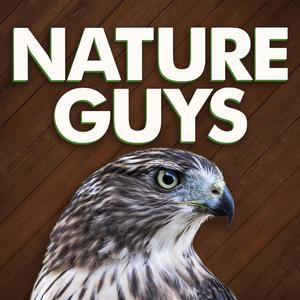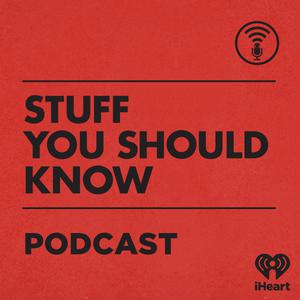
The Wild Episode
Brian Ruckley
A Collection of Wonders, Curiosities and Occasionally Horrors from the Natural World
- 30 minutes 49 secondsTexas Horned Lizard : The Pain Index III
The Texas Horned Lizard has solved a tricky problem: how to eat insects that not only have a powerful bite but also some of the most painful and lethal stings in the world ...
You can support the show - keep it going, keep it growing - and get additional content by subscribing at The Wild Episode Substack. Become a paid subscriber to get access to occasional bonus episodes.
Show notes, with photos, video and links to lots more information, are available at thewildepisode.com
Subscribe to the show to make sure you don't miss any future Wild Episodes, and e-mail your comments, corrections, suggestions or feedback to help make those future episodes better!
You can also follow the show on Facebook or Twitter.
Please share the show on social media, rate and review in your podcast app. That helps a lot. Or best of all, become a paid subscriber at The Wild Episode Substack. Thank you.
Music
Opening & Closing Themes: Running Waters and Acoustic Meditation by Audionautix (Jason Shaw), from audionautix.com. CC BY 3.0.
Modified versions of: Doppler Piano by Mark Wilson X, CC BY 4.0; Freeze and Build by AvapXia, CC BY 4.0
30 October 2024, 8:23 am - 30 minutes 20 secondsTarantula Hawk : The Pain Index II
You can support the show - keep it going, keep it growing - and get additional content by subscribing at The Wild Episode Substack. Become a paid subscriber to get access to occasional bonus episodes.
Show notes, with photos, video and links to lots more information, are available at thewildepisode.com
Subscribe to the show to make sure you don't miss any future Wild Episodes, and e-mail your comments, corrections, suggestions or feedback to help make those future episodes better!
You can also follow the show on Facebook or Twitter.
Please share the show on social media, rate and review in your podcast app. That helps a lot. Or best of all, become a paid subscriber at The Wild Episode Substack. Thank you.
Music
Opening & Closing Themes: Running Waters and Acoustic Meditation by Audionautix (Jason Shaw), from audionautix.com. CC BY 3.0.
Modified versions of: Doppler Piano by Mark Wilson X, CC BY 4.0; The Desert Archer by Pipe Choir III, CC BY 4.0; Lucid Coma by Kevin Hartnell, CC BY 4.0.
16 October 2024, 9:16 am - 34 minutes 56 secondsBullet Ant : The Pain Index I
The infamous and fearsome (or not?) Bullet Ant. The first of three loosely connected episodes about ... pain.
You can support the show - keep it going, keep it growing - by subscribing at The Wild Episode Substack. Become a paid subscriber to (if there's enough interest/support!) get access to occasional bonus episodes.
Show notes, with photos, video and links to lots more information, are available at thewildepisode.com
Subscribe to the show to make sure you don't miss any future Wild Episodes, and e-mail your comments, corrections, suggestions or feedback to help make those future episodes better!
You can also follow the show on Facebook or Twitter.
To support the show, please share on social media, rate and review in your podcast app. Or best of all, become a paid subscriber at The Wild Episode Substack. Thank you.
Music
Opening & Closing Themes: Running Waters and Acoustic Meditation by Audionautix (Jason Shaw), from audionautix.com. CC BY 3.0.
Modified versions of: Doppler Piano, A Killer in Me, Ruminations and Terror Dome by Mark Wilson X, CC BY 4.0
2 October 2024, 8:40 am - 32 minutes 25 secondsRemipede : How to be Perplexing
Remipedes! Upside-down-swimming, venom-injecting, cave-dwelling amazingness. Some of the strangest crustaceans ever discovered, living in some of the strangest places the world has to offer.
Show notes, with photos, video and links to lots more information, are available at thewildepisode.com
Subscribe to the show to make sure you don't miss any future Wild Episodes, and e-mail your comments, corrections, suggestions or feedback to help make those future episodes better!
You can also follow the show on Facebook or Twitter.
To support the show, please share on social media, rate and review in your podcast app! Thank you.
Music
Opening & Closing Themes: Running Waters and Acoustic Meditation by Audionautix (Jason Shaw), from audionautix.com. CC BY 3.0.
Modified versions of: Short Song 030223, Short Song 022723 and Short Song 022523 by Chris Zabriskie, CC BY 4.0 ; cinematic suspense series episode 004 and lost place atmospheres 001 by Sascha Ende, CC BY 4.0.
19 September 2024, 9:51 am - 30 minutes 46 secondsMyrmeconema : Gliding Ants and Red Berries
Ants that can glide and Myrmeconema, a parasitic nematode that can change the appearance and behaviour of its host. What happens when the two of them meet?
Show notes, with photos, video and links to lots more information, are available at thewildepisode.com
Subscribe to the show to make sure you don't miss any future Wild Episodes, and e-mail your comments, corrections, suggestions or feedback to help make those future episodes better!
You can also follow the show on Facebook or Twitter.
To support the show, please share on social media, rate and review in your podcast app! Thank you.
Music
Opening & Closing Themes: Running Waters and Acoustic Meditation by Audionautix (Jason Shaw), from audionautix.com. CC BY 3.0.
Modified versions of: Distant Early Warning Line and Tropospheric Scatter by Aldous Ichnite, CC BY 4.0; and Crawling, The Other Side of Darkness and Played by Ear by Unheard Music Concepts, CC BY 4.0.
18 July 2024, 9:22 am - 34 minutes 32 secondsSumatran Rhino : Sunset Song
The Sumatran Rhino, the closest living relative of the extinct Woolly Rhinoceros, is the most vocal of all rhinos. This is the story of its extraordinary voice, and its journey through the twilight of the natural world ...
Show notes, with photos, video and links to lots more information, are available at thewildepisode.com
Subscribe to the show to make sure you don't miss any future Wild Episodes, and e-mail your comments, corrections, suggestions or feedback to help make those future episodes better!
You can also follow the show on Facebook or Twitter.
To support the show, please share on social media, rate and review in your podcast app! Thank you.
Music
Opening & Closing Themes: Running Waters and Acoustic Meditation by Audionautix (Jason Shaw), from audionautix.com. CC BY 3.0.
Modified versions of: Pilgrimage - Contemplation and Pilgrimage - Inspiration by Wayne Kinos, CC BY 4.0; Mourn by Mark Wilson X, CC BY 4.0 and Ancient Rite by Kevin MacLeod, CC BY 4.0.
Sumatran Rhino and Humpback Whale vocalizations are from the paper:
Elizabeth von Muggenthaler, Paul Reinhart, Brad Lympany, R. Barton Craft; Songlike vocalizations from the Sumatran Rhinoceros (Dicerorhinus sumatrensis). ARLO 1 July 2003; 4 (3): 83–88
1 July 2024, 7:52 am - 30 minutes 29 secondsCookiecutter Shark : A Bright Shark in a Dark Ocean
The Cookiecutter Shark is famous for its gruesomely efficient parasitic attacks on whales, seals and big fish. But that is only a part of the story when it comes to this extraordinary, and extraordinarily bright, shark ...
Show notes, with photos, video and links to lots more information, are available at thewildepisode.com
Subscribe to the show to make sure you don't miss any future Wild Episodes, and e-mail your comments, corrections, suggestions or feedback to help make those future episodes better!
You can also follow the show on Facebook or Twitter.
To support the show, please share on social media, rate and review in your podcast app! Thank you.
Music
Opening & Closing Themes: Running Waters and Acoustic Meditation by Audionautix (Jason Shaw), from audionautix.com. CC BY 3.0.
Modified versions of: Icy Interlude [feat. Mystified], Uncertainty and Left Behind by Nova Beat Estate, CC BY 4.0; Lightless Dawn by Kevin Macleod (incompetech.com), CC BY 4.0.
13 June 2024, 6:52 am - 30 minutes 57 secondsGiant Barrel Sponge : Methuselah on the Reef
The Giant Barrel Sponge: one of the simpler animals on Earth yet grows to enormous size over a crazily long life, exerts a big influence on reef ecosystems and, unlike a great many animals in our oceans, seems to be thriving ...
Show notes, with photos, video and links to lots more information, are available at thewildepisode.com
Subscribe to the show to make sure you don't miss any future Wild Episodes, and e-mail your comments, corrections, suggestions or feedback to help make those future episodes better!
You can also follow the show on Facebook or Twitter.
To support the show, please share on social media, rate and review in your podcast app! Thank you.
Music
Opening & Closing Themes: Running Waters and Acoustic Meditation by Audionautix (Jason Shaw), from audionautix.com. CC BY 3.0.
Modified versions of: Equatorial Complex by Kevin Macleod (incompetech.com), CC BY 4.0; Short Song 011123, Short Song 011023 and Short Song 011323 by Chris Zabriskie, CC BY 4.0.
23 May 2024, 7:31 am - 33 minutes 15 secondsAldabra Giant Tortoise : The One and Only
The Aldabra Giant Tortoise is an amazing survivor of a lost time - very recently lost - when giant tortoises dominated many of the islands in the Indian Ocean. Aldabra Atoll is the only place in the world you can still see great herds of tens of thousands of these huge reptiles.
Show notes, with photos, video and links to lots more information, are available at thewildepisode.com
Subscribe to the show to make sure you don't miss any future Wild Episodes, and e-mail your comments, corrections, suggestions or feedback to help make those future episodes better!
You can also follow the show on Facebook or Twitter.
To support the show, please share on social media, rate and review in your podcast app! Thank you.
Music
Opening & Closing Themes: Running Waters and Acoustic Meditation by Audionautix (Jason Shaw), from audionautix.com. CC BY 3.0.
Modified versions of: Lost Frontier and Lost Time by Kevin MacLeod, CC BY 3.0 and Quiet Endings by Mark Wilson X, CC BY 4.0.
9 May 2024, 7:45 am - 32 minutes 6 secondsPhrynus longipes : The Whip Spider in the Cave
The Whip Spider Phrynus longipes is not a spider but one of the craziest-looking arachnids on Earth. They're also territorial and cannibalistic, so how do they manage to survive at super high densities in Caribbean caves without eating each other?
Subscribe to the show to make sure you don't miss any future Wild Episodes, and e-mail your comments, corrections, suggestions or feedback to help make those future episodes better!
You can also follow the show on Facebook or Twitter.
To support the show, please share on social media, rate and review in your podcast app! Thank you.
Show notes, with photos, video and links to lots more information, are available at thewildepisode.com
Music
Opening & Closing Themes: Running Waters and Acoustic Meditation by Audionautix (Jason Shaw), from audionautix.com. CC BY 3.0.
Modified versions of: Solitude and Morpheus Cave by Mark Wilson X, CC BY 4.0, God, Why Do You Do What You Do to Me and They Call It Nature by Chris Zabriskie, CC BY 3.0, and Horror 13 from audionautix.com. CC BY 3.0.
23 April 2024, 7:10 am - 33 minutes 3 secondsGlacier Lanternfish : The Scatterers
The Glacier Lanternfish is one of the most important fish in the world - part of arguably the greatest, and most under-appreciated, concentration of animal life on the planet. Which we can only really 'see', and understand, using sound.
Subscribe to the show to make sure you don't miss any future Wild Episodes, and e-mail your comments, corrections, suggestions or feedback to help make those future episodes better!
You can also follow the show on Facebook or Twitter.
To support the show, please share on social media, rate and review in your podcast app! Thank you.
Show notes, with photos, video and links to lots more information, are available at thewildepisode.com
Music
Opening & Closing Themes: Running Waters and Acoustic Meditation by Audionautix (Jason Shaw), from audionautix.com. CC BY 3.0.
Modified versions of: Acoustic Ambient Improv #1, Acoustic Ambient Improv #2, Acoustic Ambient Improv #3 and Acoustic Ambient Improv #8 by Ryan Lutton, CC BY 3.0
8 April 2024, 9:33 am - More Episodes? Get the App
Your feedback is valuable to us. Should you encounter any bugs, glitches, lack of functionality or other problems, please email us on [email protected] or join Moon.FM Telegram Group where you can talk directly to the dev team who are happy to answer any queries.
 Outside/In
Outside/In
 Outside Podcast
Outside Podcast
 Nature Guys
Nature Guys
 Ologies with Alie Ward
Ologies with Alie Ward
 Creature Feature
Creature Feature
 Stuff You Should Know
Stuff You Should Know